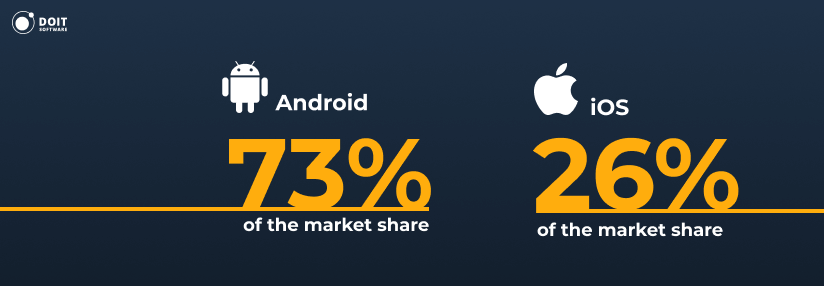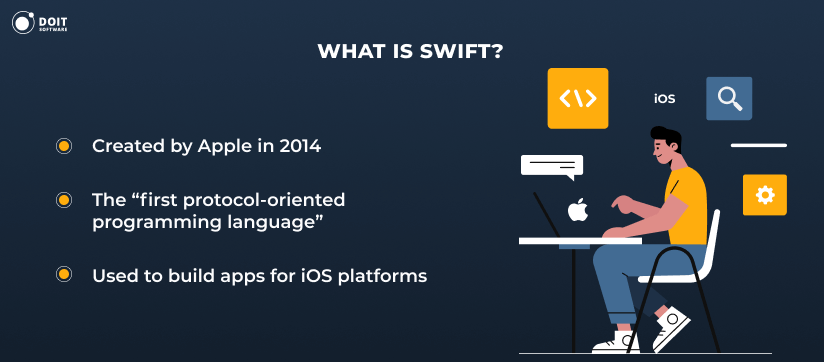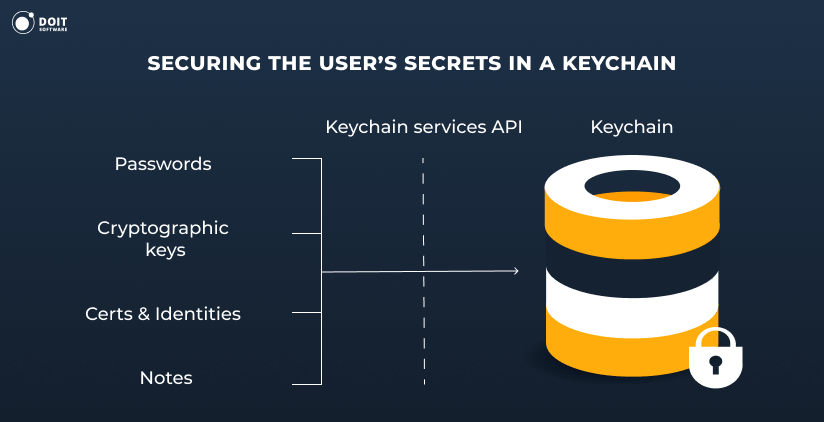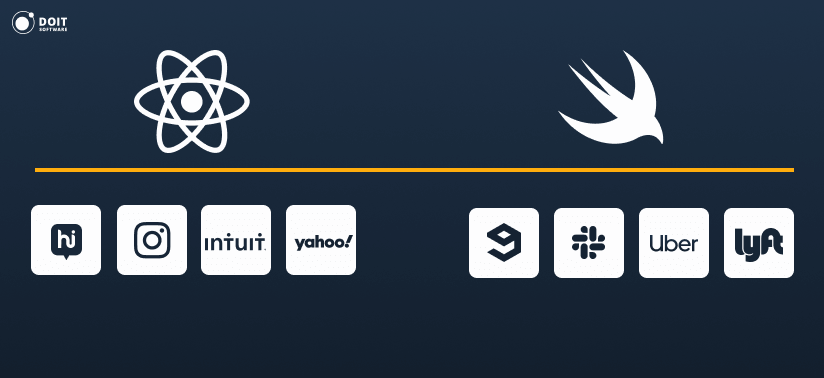Mobile applications are getting increasingly more sophisticated, feature-rich, and popular. And even though Android takes up 72% of the market share, while iOS only 28%, there are almost 1.5 times as many applications available on the App Store compared to Google Play. But why do companies prefer to build apps for iPhones?

The reason behind this preference is statistics that show that iPhone owners tend to have higher incomes and spend more on in-app purchases. That’s why today we will dive into iOS app development and compare React Native vs Swift.
Since monetization is one of the biggest goals of every app development, it is no surprise that businesses decide to build iOS apps first. Usually, when tech experts talk about iOS app development, they mention Swift – a programming language that allows the creation of native iOS solutions.
However, React Native also comes up in the conversation as this JavaScript framework is a well-known tool for building platform-independent mobile apps. In this article, we will take a closer look at Swift and React Native for iOS development, discuss the pros and cons of each technology, and their main features and utilization. Let’s compare React vs Swift and find out who the winner is.
Swift is a compiled programming language that was created by Apple specifically for developing native iOS applications. The language is only 10 years old but has already gained a lot of traction in mobile app development. Companies that previously used Objective-C for their app development switched to Swift to take advantage of its flexibility, conciseness, and simplicity.

The main goal of creating Swift was to attract more developers into development for iOS and macOS. As Objective-C is quite complicated, Swift is much simpler and enables developers to utilize native hardware features and build feature dense and high-quality applications. Leveraging the capabilities of Apple software allows companies to build more advanced solutions using camera, GPS, Bluetooth, etc.
Why have companies switched to Swift to build iOS applications? What makes it such a popular choice in the mobile development arena?
The official Apple website claimed that Swift is 2.6 times faster than its predecessor, Objective-C. Swift has a simple syntax and employs the LLVM tool to compile the code directly to the machine code. As the name of the language suggests, building an app with Swift accelerates the development processes.
The syntax of the language is simpler and easier to grasp, which makes it a more readable technology when compared to others. Developers also need fewer code lines to produce a functional application, thus shortening the time to market.
Swift mobile development is less error-prone as it comes with type-safe features. This lets developers catch potential errors in code while typing and prevents them from bringing mistakes to code execution. On top of that, Swift automatically defines all memory accesses, thus protecting the program from crashing.

ABI (Application Binary Interface) stability came into effect with the Swift 5 version of the language and solved a major issue. Without this feature, every time a new version of the language was launched and developers tried to implement it into the existing application, some features crashed. ABI stability prevents this from happening, and ensures that all language versions are compatible with each other.
Being lighter, Swift written applications take less time to install and require less memory storage on the device. The language is also specifically created for native iOS development, and it gives more access to the native device’s features. As a result, you can build apps that look and perform better, and attract more users.
What is the difference between Xcode and Swift? The latter is a programming language while the former is an IDE that helps you create great applications. Using Swift for iOS native app development gives access to Xcode. Working together, these technologies allow you to build apps for macOS, tvOS, watchOS, and iOS. You can even create applications for Linux and Windows and expand your target audience.
Does Swift have any serious disadvantages that you should know of? How do they affect the development process and user experience?
Being a relatively new technology, Swift has a long way to go in building a strong community and developing helpful libraries and packages. However, the language has already gained a lot of attention from the mobile app development community and is considered one of the best languages for app development. At the same time, if you choose to go with Swift, you might need to spend more time finding seasoned professionals, especially if we compare React Native vs Swift.

React Native is a JavaScript framework created by the Facebook team to accelerate mobile development processes and build apps across platforms. In Swift vs React Native, the latter is supported by JavaScript which is the most popular language in the world, according to Statista. With almost 62.3% of developers’ support, JavaScript is way ahead of Swift in popularity and usage.
Besides, building cross-platform programs is more cost and time efficient, and allows you to penetrate the market sooner. On the other hand, platform independent apps tend to be less powerful and present a poorer user experience. Let’s talk about React Native’s benefits and drawbacks in more detail before investigating the main differences between React Native vs Swift.
How easy is it to build a React Native iOS app, and what are the functions of the framework that make the development faster?
As already mentioned, React Native is operating system independent, which significantly reduces the development cycle and time to market. This is achieved by writing one code and deploying it to both platforms with a few native tweaks.
Building one program for both iOS and Android allows you to have one JavaScript team on staff instead of having two native development teams. You will also avoid timeline discrepancies that often occur when you have two teams developing two applications at the same time. Finally, having one single team doing all the work prevents issues that occur when one of the developers calls in sick since his or her teammates can easily pick up the slack.
According to nmpJS, React Native has nearly 33,000 libraries and packages, while a similar search engine on the Swift website shows only 3,800 packages. Certainly, the number alone does not guarantee the quality of the language or framework, however, it does prove the community’s commitment and enthusiasm to contribute. For any technology, this commitment is crucial for further development.
The process of software development does not end with writing code, but extends to testing, releasing, bug fixing, etc. Developers prefer to automate these tasks to accelerate the process and to avoid routine. React Native allows you to delegate mundane tasks to third-party services like Bitrise, AppCenter, Amplify, and others.
Although you cannot build a 100% native to iOS React Native iPhone app, you can create some parts of the app using this cross-platform technology and save costs. In other words, you can build crucial parts using native tools and less performance affecting features with React Native. This way, you can deliver a cost-effective native application in a shorter amount of time.
Cross-platform solutions always lose to native apps when it comes to performance and speed. React Native applications take up more space on the device and on average create a worse user experience for your customers. However, this issue becomes relevant only if you talk about high dynamic products like games.
Although creating applications with React Native speeds up the process due to a single code source, the process of testing takes up more time when comparing React Native vs Swift. React Native apps require more time and precision when it comes to running tests, as errors are likely to appear on both platforms.

Knowing the weaknesses and strengths of native and cross-platform mobile development as well as that of Swift and React Native iOS development, let’s see which technology suits your project.
React Native uses native components and APIs and allows building native-like applications that look and seem very close to native. Swift was built exclusively for native iOS development which guarantees top-notch UI elements for iOS devices.
While React Native can deliver a decent native like UI, it cannot reach the same amount of stability when compared to Swift. Using native development language, you can leverage the device’s features and build a more stable and feature-rich application.
Here too, Swift takes the lead, as native development almost always provides superior performance over cross-platform development. Especially when it comes to dynamic and graphic effects-dense applications, Swift is way ahead of the competition.
Coding speed really depends on your goals. If you are developing an application only for iOS, then Swift is definitely your choice. However, if you would like to launch your solution on both iOS and Android, React Native will guarantee faster results.
Although it is hard to compare these as React Native is a framework and Swift is a language, one can still conclude that React Native has a much bigger community. But Swift has proven to be very popular and useful among the mobile app development community, and has been gaining more and more attention over time.
Swift developers’ rates on average are higher than rates of JavaScript coders. While we will talk about the costs in detail in the next part, the average numbers for developers look like the following:
The US: Swift developers - $75-110 and $40-65 in Eastern Europe
React Native coders in the US - $70-110 and $35-60 - in Eastern Europe.
The difference is negligible, however, React Native development cycle is usually shorter as it delivers two applications with one code, which makes it overall a cheaper option.
React Native is a framework that supports JavaScript - the most used language. As already mentioned, 68% of developers employ JS for their coding, which means that these developers can easily adapt React Native in their work. Swift, on the other hand, is quite easy to learn, but it still requires a learning curve.
Since both tools were developed by well-respected and seasoned tech giants - Facebook and Apple, both React Native and Swift have excellent documentation.

Businesses prefer Swift when building apps that require high memory management and outstanding UIs. Besides that, Swift is a good choice for native iOS development that will be further extended to other Apple products such as laptops, tablets, TVs, and wearables.
Companies select React Native for iOS development when developing an MVP or prototype due to its simplicity and fast coding speed. React Native app can also be deployed to both iOS and Android, which makes it a good choice for companies that are under a time constraint and require an affordable solution as soon as possible. Finally, React Native developers can create a simple React Native iPhone app that does not utilize the device’s features, such as the camera and Bluetooth.

Costs of hiring vary from the type of employment, project duration and the complexity of the app, as well as location. Although the salaries of React Native or Swift developers do not differ that much, let’s take a look at the average compensation across several countries. Hourly rates will vastly affect the overall bill for the app development and considerably affect your budget.
In this section, we will compare Swift vs React Native developers rates across different countries.
USA
$75-110
$70-110
UK
$55-70
$50-60
Germany
$60-70
$65-75
Eastern Europe
$40-65
$20-30
Your choice between React Native vs Swift depends on many factors, including the type of application, project duration, budget, and even personal preference. For example, if you have developers on staff who know JavaScript and can easily build an app with React Native, choosing Swift will have to be justified. But if you are looking to build a high performance dynamic app with complex graphic effects, you will not go wrong with Swift.
If you would like to know more about the technologies or how to make an app with Swift or React Native, contact DOIT Software. Our experts will help you figure out the React Native iOS vs Android app development, enlighten you about the benefits of Swift, and lead you to the right technology for your next project.
Besides that, our specialists will walk you through the discovery phase and give you guidance when it comes to other languages and frameworks, and help you decide between React Native vs Swift vs Kotlin, React Native vs Flutter, etc.
Transform your idea into a successful product with the DOIT Software team.
Contact usReact Native is a JavaScript framework commonly used to create platform independent applications and prototypes. The framework has huge support and entails a large number of libraries and packages to build great iOS and Android solutions.
Swift is a language created by the Apple team and used to build native Swift iOS applications. Apps built with Swift are fast and stable as well as capable of utilizing native device’s functions like the camera and GPS and creating feature-rich products.
The main difference is that React Native can be adopted for building applications across platforms, whereas Swift is a language used for the creation of native iOS applications.
React Native is a perfect choice for building basic applications without utilizing the native device’s features. This framework also saves development time and costs by allowing developers to deploy one code to different platforms, which is why React Native is a go-to choice for MVPs and prototypes.
Companies decide to build an app with Swift when they need a more complex and sophisticated solution with graphic effects and device-native features. Swift is also usually chosen by businesses that have a little more time and money to spend and are ready to invest in a product with high performance.
Flutter is a Dart framework that is also widely used for cross-platform app development. Dart is easy to learn but is mostly employed for building Android apps. JavaScript is already mastered by thousands of developers which makes React Native a preferable choice for cross-platform development. Swift, on the other hand, allows developers to create native iOS applications which can be pricier but provide a better user experience.










